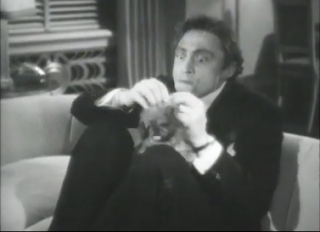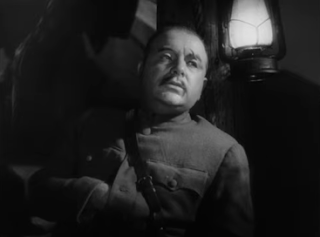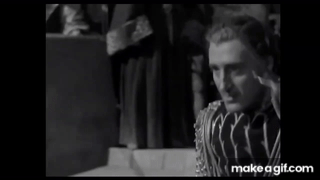This is where it all started.
After 1935's Best Actor race had three nominees from the same film, and in the wake of Actors Guild protests against the ceremony, the Academy set a definite field of five for its directing, writing, and acting categories...and added two to the latter. Those two are Best Supporting Actor and Best Supporting Actress. Finally, the performers perennially below the title were finally getting their due!
While recent years have seen the category go to either marquee names "slumming" it in character parts or lead actors campaigning as supporting to better their chances of winning (Kaluuya, Pitt, Ali, arguably Rockwell), the inaugural category is a who's who of 1930s supporting stars. Mischa Auer has twelve credits in 1936, including Oscar-nominated films That Girl from Paris, Three Smart Girls and Winterset; not all the roles have names, and some are even uncredited. Akim Tamiroff has seven credits, many of them not so much supporting as they are cameos, as in Anthony Adverse and The Story of Louis Pasteur. Stuart Erwin was a sometimes-leading man (we nominated him in Leading Actor at the 1931-32 Retro Hollmann Awards for Make Me a Star), but most of his six 1936 credits have him second- or third-billed - his nomination comes from a film where he's top-billed, but it's an ensemble flick and he's only ten minutes of it. Basil Rathbone was still three years away from Sherlock Holmes, but he appears in two Best Picture nominees (Romeo and Juliet, A Tale of Two Cities) and the Technicolor marvel The Garden of Allah.
And then there's Walter Brennan.
Brennan had been working as an extra and stand-in since 1925. Sometimes he'd get a featured part - a line of dialogue here, a reaction shot there. He credits the growth of his parts to the fact that he was kicked in the face during one of those appearances, resulting in several lost teeth and a sudden aged appearance, being cast as old codgers at the age of 40. In 1935, he did 24 feature films, most of them uncredited, but among them is Barbary Coast, where he gives the film's best performance as Old Atrocity. It's the role that changed his career: in 1936, five of his six credits are major supporting parts, including parts in nominated films Banjo on My Knee, Fury, and These Three. Back in 1936, a committee of 50 decided the nominees, but all guild members could vote...including members of the Extras Union. It is believed their support led to Brennan's triumph as the first Best Supporting Actor winner - he was, after all, the extra who made it.
But maybe it wasn't just support from comrades-in-arms that led to that win. Maybe the performance itself is genuinely deserving. Let's discuss, shall we?:
Mischa Auer as Carlo
My Man Godfrey
***
first and only nomination
The role: A young "protege" of society matron Mrs. Angelica Bullock. Film also nominated for Screenplay, Supporting Actress, Actor, Actress, and Director.
The performance: I think we all know what is meant when Carlo is referred to as Mrs. Bullock's "protege." Auer reminds us at every turn of the man's resentment at having to sing for his supper - or, at least, "play ape" for it. The eye rolls, the sighs, the defeated look that punctuates every turn of his. He only really comes alive when he can just be at parties, he's much more in his element there. Auer's performance makes Carlo equal parts contrite child, exhausted employee, and casual leech. His physicality in the "chimp" sequence is great, too.
Walter Brennan as Swan Bostrom
Come and Get It
****
first of four nominations
The role: Come and Get It follows logging magnate Barney Glasgow across twenty years. He gives up a romance with a beautiful saloon singer in favor of marriage to his boss's daughter; decades later, he meets the singer's daughter, a dead ringer for her mom, and attempts to resume the courtship... Swan Bostrom is his faithful friend from back in the day, a Swede. When Barney leaves, Swan winds up marrying the saloon singer; decades later, he's a widower, and it's his daughter who sets his old friend's heart aflame. Film also nominated for Editing.
The performance: If you think Brennan always gave the same hayseed performance, maybe this will shake you out of that. It's not just the Swedish accent. Brennan makes sure that we see Swan's decency and his choice to be so very clear. He shows us Swan's watchful eyes taking in a situation and choosing to believe in the good of Glasgow. He shows us how that which makes a man decent also makes him an enabler. It's a practiced naivete, but that does not take away from his genuine sweetness.
Stuart Erwin as Amos Dodd
Pigskin Parade
*
first and only nomination
The role: A farmer recruited by a small college to join their football team after the coach sees his superhuman athletic skills. Pigskin Parade is an ensemble film but mostly focuses on coach Slug Winters (Jack Haley) and his wife Bessie (Patsy Kelly), new arrivals to a small Texas town from Long Island to take over the local college's football team. When they are accidentally invited to compete against Yale University, they need new talent - and Dodd fits the bill. Mostly an excuse for some gags and songs (about eleven of them!). The debut film of Miss Judy Garland.
The performance: Shocking that he was nominated for this instead of his more substantial work in Ceiling Zero or Exclusive Story, but nice that even a performance in one of those musical variety programmers could be considered in the early days. It'd be nicer if it was anything more than just existing on screen. How did voters remember this performance?
Basil Rathbone as Tybalt
Romeo and Juliet
*****
first of two nominations
The role: A cousin of Juliet's, a master swordsman who's suspicious of Romeo and hates the Montagues. Film also nominated for Art Direction, Actress, and Best Picture.
The performance: Gotta say, that swordfight with first Mercutio, then Romeo, with a triumphant pint in between, leaves its mark. I've been thinking about Rathbone in this film since I watched it. He's so full of life, the realization that he's losing his duel against Romeo all over his face: shocked, afraid, faced with his own mortality. It's a brief performance, but one that lasts.
Akim Tamiroff as General Yang
The General Died at Dawn
**
first of two nominations
The role: A Chinese warlord hoping to gain possession of a cache of weapons to use against a rival government entity. Film also nominated for Cinematography and Score.
The performance: Despite the touting of the innovative prosthetics used to transform the Armenian Tamiroff into Chinese General Yang, he never looks like anything other than what he is: a non-Asian in dress-up. He is not helped by either the self-conscious phlegmatic line readings nor the stiff body language - perhaps meant to imply age and power, but oddly waxen instead. His stirring climactic moment with his crew, commanding them to die alongside him, is what got him the nomination. Hell, it's the best part of the movie!
--------------------------
Brennan is deserving, and probably has the largest role of the nominees. But, I have to go with the performance that I think about even while cleaning the kitchen, the performance that makes me sigh, "God, what an actor!":
BASIL RATHBONE
in
ROMEO AND JULIET
Tomorrow, the nominees for Best Supporting Actress: Beulah Bondi (The Gorgeous Hussy), Alice Brady (My Man Godfrey), Bonita Granville (These Three), Maria Ouspenskaya (Dodsworth), and Gale Sondergaard (Anthony Adverse).








No comments:
Post a Comment